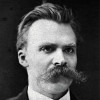“ But those who exchange not pleasure but utility in their amour are both less truly friends and less constant. ”
Aristotle, Nicomachean Ethics (c. 334 BC - 330 BC). copy citation
| Author | Aristotle |
|---|---|
| Source | Nicomachean Ethics |
| Topic | utility pleasure |
| Date | c. 334 BC - 330 BC |
| Language | English |
| Reference | |
| Note | Translated by W. D. Ross |
| Weblink | http://classics.mit.edu/Aristotle/nicomachaen.mb.txt |
Context
“(for the one finds no pleasure in the sight of the other, and the other gets no attentions from the first) ; but many lovers on the other hand are constant, if familiarity has led them to love each other's characters, these being alike. But those who exchange not pleasure but utility in their amour are both less truly friends and less constant. Those who are friends for the sake of utility part when the advantage is at an end; for they were lovers not of each other but of profit.
For the sake of pleasure or utility, then, even bad men may be friends of each other, or good men of bad, or one who is neither good nor bad may be a friend to any sort of person, but for their own sake clearly only good men can be friends;”
source


